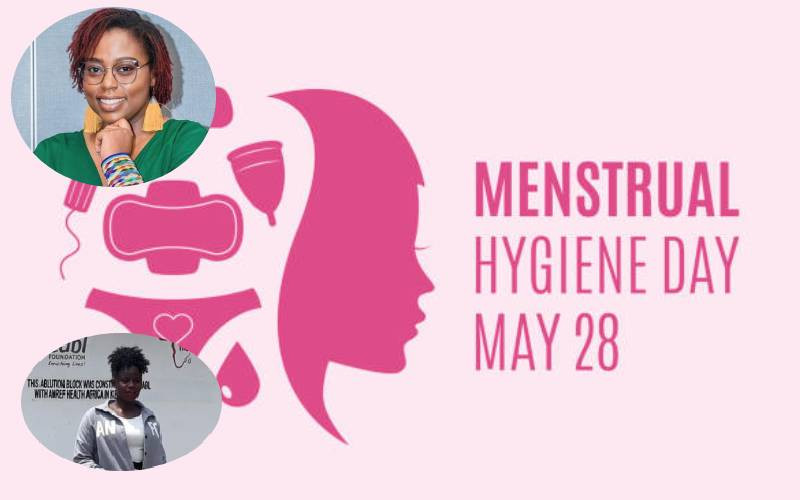
While girls her age around the world attend school and enjoy learning, 14-year-old Susan, * not her real name, from Imaroro Ward in Kajiado District, moans in pain. Not only is she suffering from dysmenorrhoea, or menstrual cramps, but she is also psychologically traumatised.
Later in the day, she is forced to change the pads donated by well-wishers, and her anxiety increases. Living in an area where pit latrines are few and non-existent in other homesteads, she uses them not only to relieve herself but also to dispose of used pads.
The topic of menstrual health management is still taboo in the Maasai community and is often discussed in hushed tones. Usually between mothers and daughters.
"It is taboo to burn one's blood, and that would have been the ideal scenario for disposing of used pads or throwing them in the pit latrines. However, most households in Kajiado practice open defecation, which makes this virtually impossible," says Jedidah Lemaron, the executive director of the Kajiado-based Malkia Initiative.
The Kajiado Baseline Survey 2020, had it that more than half of the county residents (51 per cent) go on their business in the bushes, a practice embedded in the Maasai pastoralist way of life.
As the world marked the 10th anniversary of Menstrual Hygiene Day, amidst all the pomp, stakeholders are still concerned about the issue of disposal of waste.
“The only private and safe space for these girls is in schools where you will find the facilities are inadequately kept, dirty, used by both male and female students, and frequently feature damaged doors, significantly impacting the privacy of the female students,” says Jedidah.
With this year’s theme being #PeriodFriendlyWorld, there is much that needs to be done when it comes to awareness and public education.
- Returning to work after maternity leave
- Teach your children good values at an early age
- Keeping your children busy over the holidays
- Safely include your children in the kitchen with these tips
Keep Reading
“For the girls, to avoid the shame and stigma associated with menstruating, they opt to skip classes and this eventually leads to poor performances leading to low confidence and self-esteem. That is something that needs to be addressed,” adds Jedidah.
Away from the rural settings, in the city, the menace continues to bite in the same way. For adolescent girls and young women (AGYW) especially those living in the slums area, disposal of menstrual waste is a daunting task.
Winnie Otieno a community champion in the Mathare area has faced this conundrum, despite helping build an ablution block for Jangwani residents in the sprawling Mathare slums.
“Young girls especially teenagers are sensitive when it comes to their menstrual health due to the stigma associated with it. Most often hide the pads or those who use socks and pieces of mattresses, have difficulty disposing of them and after a few days, the whole house is engulfed in a foul stench. Others throw them in the ablution blocks which end up blocking sewer lines,” intimates Winnie.
The informal settlements in the city lack effective waste management systems, resulting in the accumulation of waste, including menstrual waste, on streets and in open spaces.
“With garbage collection in the city being expensive, residents of Jangwani often dump their wastes into the Mathare River. In places in Kibera where we have flying toilets, girls wrap up the used pads and throw them casually in the streets. It is now a common eye sore alongside diapers. All these are non-biodegradable and the result is heaps of them along roadsides,” she adds.
Winnie says improper management of menstrual waste has detrimental effects on the environment, as it can contaminate the soil, water, and air. This in turn can become a health hazard if not properly addressed.
Kenya launched its Menstrual Hygiene Management (MHM) Policy in May 2020 and has made significant progress such as integrating MHM into various government initiatives.
While acknowledging the herculean challenges the health sector faces, Mary Muthoni Muriuki, Principal Secretary of the state Department of Public Health and Professional Standards in the Ministry of Health, says the challenges persist, which has necessitated sustained support and improvement efforts.
"We have made significant strides in providing accurate information on menstruation and promoting affordable access to quality menstrual products and sanitation facilities," stated Muthoni. "Sustainable menstrual waste management practices have been implemented through initiatives such as the 'Epuka Uchafu Campaign,'" she noted in a statement.
 The Standard Group Plc is a multi-media organization with investments in media platforms spanning newspaper print
operations, television, radio broadcasting, digital and online services. The Standard Group is recognized as a
leading multi-media house in Kenya with a key influence in matters of national and international interest.
The Standard Group Plc is a multi-media organization with investments in media platforms spanning newspaper print
operations, television, radio broadcasting, digital and online services. The Standard Group is recognized as a
leading multi-media house in Kenya with a key influence in matters of national and international interest.










